巴蜀英才2017春七年级英语下册Module4LifeinthefutureUnit1Everyonewillstudyathome第1课时作业课件
七年级英语下册 Module 4 Life in the future Unit 1 Everyon
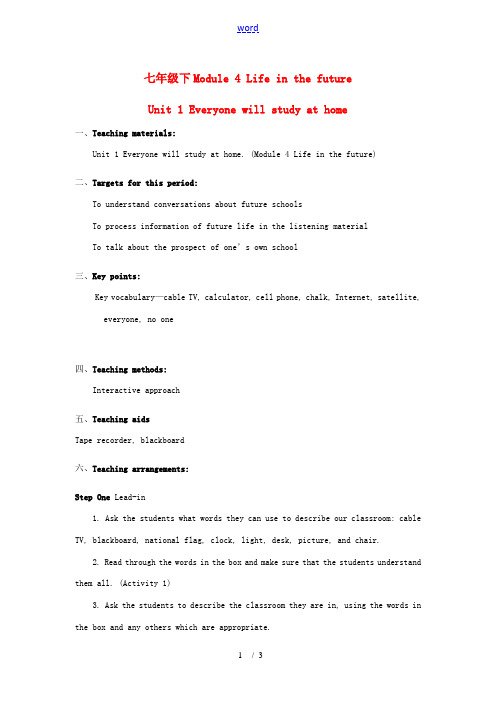
七年级下Module 4 Life in the futureUnit 1 Everyone will study at home一、Teaching materials:Unit 1 Everyone will study at home. (Module 4 Life in the future)二、Targets for this period:To understand conversations about future schoolsTo process information of future life in the listening materialTo talk about the prospect of one’s own school三、Key points:Key vocabulary—cable TV, calculator, cell phone, chalk, Internet, satellite, everyone, no one四、Teaching methods:Interactive approach五、Teaching aidsTape recorder, blackboard六、Teaching arrangements:Step One Lead-in1. Ask the students what words they can use to describe our classroom: cable TV, blackboard, national flag, clock, light, desk, picture, and chair.2. Read through the words in the box and make sure that the students understand them all. (Activity 1)3. Ask the students to describe the classroom they are in, using the words in the box and any others which are appropriate.4. Ask the students to do the task individually, and then check with a partner. Step Two Pre-Listening (Activity 2)1. Provide the question first: What do you use to study English?2. Divide the students into several groups and discuss what they use to study English and collect a few pairs’ dialogues in a whole-class setting.Step Three Introductions (Activity 3)1. Introduce “everyone, no one” by using a few examples that are true.2. Remind the students that “everyone” and “no one” take a third personsingular verb.3. Ask the students to make sentences by using everyone and no one.e.g. Everyone uses a pen. (肯定)Everyone doesn’t use a pen. = Not everyone uses a pen. (部分否定) No one uses a pen. (完全否定)Step Four Listening1. Read through the sentences in the chart and make sure that they understandthe sentences.2. Ask the students to listen to the dialogue and finish the exercises in Activity 4.3. Collect the answers from the class.4. Ask the students to listen to the dialogue again and finish the exercisesin Activity 5.5. Ask the students to do the exercises individually, then check with a partner.6. Collect the answers from the class, having one student ask and another studentanswer each question.Step Five To read aloud the conversation againStep Six Detail explanationI think that everyone will study at home and will use puter.Think 引导宾语从句,否定必须前置e.g. I don’t think that everyone will study at home and will use puter.I think you are right to do so.I don’t think you are right to do so. (不用I think you aren’t rightto do so.)1.with (使用有形的工具或器官)e.g. We work with our hands (器官)This pair of shoes is made by hand. (手工)Step Seven the stressed words (Activity 7)1.Ask the students to say the four words and decide how many syllables thereare in each one.2.Collect their answers and write the words on the board to show where thebreaks are.3.Practice saying the words with the class.Dic/tion/ar/y cal/cu/la/tor /pu/ter sat/el/liteStep Eight Pair working (Activity 8)1. Ask the students to think about this for a while individually—to organizetheir ideas about their school in the future.2. Pair them to discuss their ideas.3. Pre-teach them “What do you think?” to help keep the conversation going.。
2017春外研版七年级英语下册(课件+教案+检测+素材)Module 4 Life in the future (57份打包)M4 Unit 3
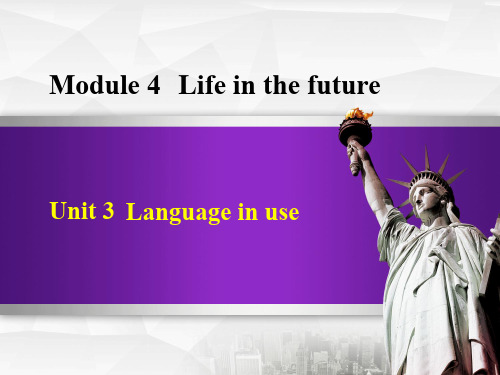
heavy work small plane interesting job traffic jam
Around the world Robots in Japan Japan has many robots now and you can see lots of them in the country . You can find worker robots,robots that clean your home,and even robots you can play with .
She sends her kids to bed early . 她早早打发孩子们上床睡觉。
拓展 与send有关的词组
讲解来自《点拨》
He is ill. Send for a doctor . send for 派人去请
他病了,请个大夫来。
send away 解雇
The boss sent him away . 老板把他解雇了。
send up 发射
Some countries sent up man-made satellites into space. 一些国家发射人造卫星到太空。
讲解来自《点拨》
典例 1 His leg is seriously injured in the accident .
____B____a doctor at once .
robots to do everything . They will cook,clean the house and drive buses . People will travel by plane a lot . Children will have a lot of free time . At school,we won't have books or pens,and we won't have teachers . We'll learn from robots and the Internet . Working hours will be short and people will have long holidays . In the future, the weather will change . It will be hotter and there will be more rain . Life in the future will be very interesting!
近年七年级英语下册 Module 4 Life in the future Unit 2 Ever

2017七年级英语下册Module 4 Life in the future Unit 2 Every family will have a small plane同步练习(新版)外研版编辑整理:尊敬的读者朋友们:这里是精品文档编辑中心,本文档内容是由我和我的同事精心编辑整理后发布的,发布之前我们对文中内容进行仔细校对,但是难免会有疏漏的地方,但是任然希望(2017七年级英语下册Module 4 Life in the future Unit 2 Every family will have a small plane同步练习(新版)外研版)的内容能够给您的工作和学习带来便利。
同时也真诚的希望收到您的建议和反馈,这将是我们进步的源泉,前进的动力。
本文可编辑可修改,如果觉得对您有帮助请收藏以便随时查阅,最后祝您生活愉快业绩进步,以下为2017七年级英语下册Module 4 Life in the future Unit 2 Every family will have a small plane同步练习(新版)外研版的全部内容。
Module 4 Life in the futureUnit 2 Every family will have a small plane.Ⅰ.单项选择1.There ______ a sports meeting next week。
A.will B.will hasC.is going to D.i s going to be2.-Will your parents live in London?—______ They will live in Shanghai.A.No,they aren't.B.Yes,they are.C.No,they won't。
D.Yes,they will.3.Lily ______ stay at home this afternoon.She will go to the library。
七年级英语下册Module4Lifeinthefuture教案设计外研版
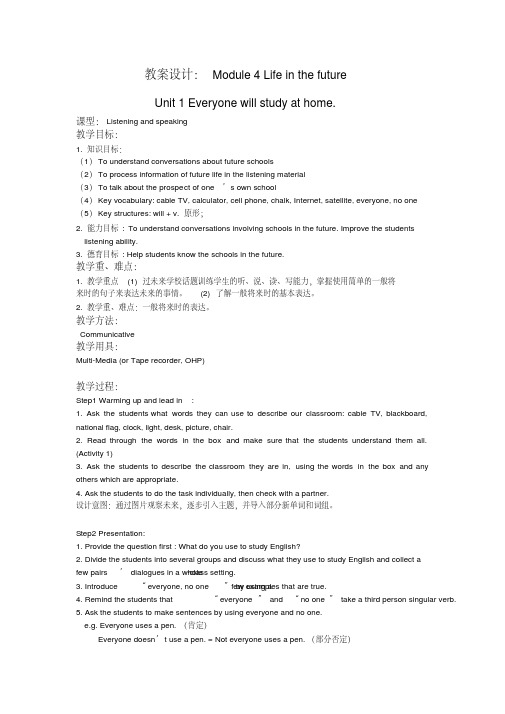
教案设计:Module 4 Life in the futureUnit 1 Everyone will study at home.课型:Listening and speaking教学目标:1. 知识目标:(1)To understand conversations about future schools(2)To process information of future life in the listening material(3)To talk about the prospect of one’s own school(4)Key vocabulary: cable TV, calculator, cell phone, chalk, Internet, satellite, everyone, no one(5)Key structures: will + v.原形;2. 能力目标: To understand conversations involving schools in the future. Improve the studentslistening ability.3. 德育目标: Help students know the schools in the future.教学重、难点:1. 教学重点(1) 过未来学校话题训练学生的听、说、读、写能力,掌握使用简单的一般将来时的句子来表达未来的事情。
(2) 了解一般将来时的基本表达。
2. 教学重、难点:一般将来时的表达。
教学方法:Communicative教学用具:Multi-Media (or Tape recorder, OHP)教学过程:Step1 Warming up and lead in:1. Ask the students what words they can use to describe our classroom: cable TV, blackboard, national flag, clock, light, desk, picture, chair.2. Read through the words in the box and make sure that the students understand them all. (Activity 1)3. Ask the students to describe the classroom they are in, using the words in the box and any others which are appropriate.4. Ask the students to do the task individually, then check with a partner.设计意图:通过图片观察未来,逐步引入主题,并导入部分新单词和词组。
七年级英语下册Module4LifeinthefutureUnit2Everyon
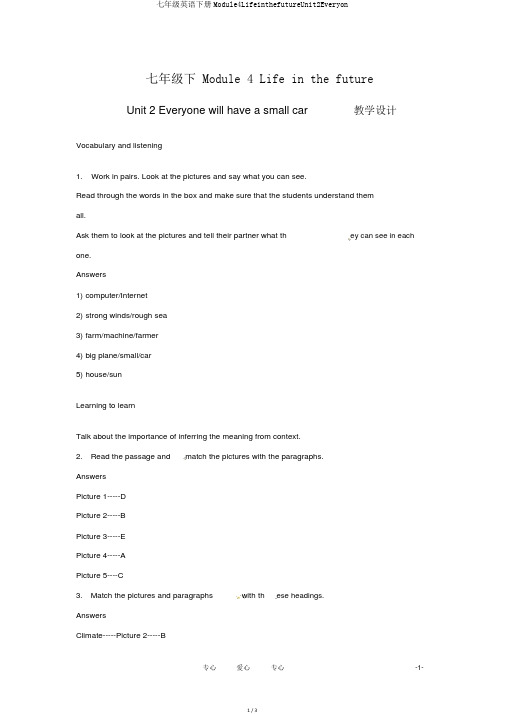
七年级下 Module 4 Life in the futureUnit 2 Everyone will have a small car教学设计Vocabulary and listening1.Work in pairs. Look at the pictures and say what you can see.Read through the words in the box and make sure that the students understand themall.Ask them to look at the pictures and tell their partner what th ey can see in each one.Answers1)computer/Internet2)strong winds/rough sea3)farm/machine/farmer4)big plane/small/car5)house/sunLearning to learnTalk about the importance of inferring the meaning from context.2. Read the passage and match the pictures with the paragraphs.AnswersPicture 1-----DPicture 2-----BPicture 3-----EPicture 4-----APicture 5----C3. Match the pictures and paragraphs with th ese headings.AnswersClimate-----Picture 2-----BHomes-- ----Picture 5---- CJobs--------- P icture 3- ----ETechnology-Picture 1----- DTransport---- Picture 4----- A4. Match the words in Box 1with the words which mean the opposite in Box 2. Usethe passage to help you.Answerscheap---expensiveeasy ---difficulth ot---coldlarge---smallnew---oldstrong---weakwarm---coolcomfortable---uncomfortableg ood---badinteresting---dulllight---heavyshort---longrough---smoothWhich words are not in the passage?Ask the Ss to find out which words are not in the passage indi vidually.5.Answer the questions.Answers1)Fuel.2)North Pole.3)It ’s warm in spring, hot in summer and cool in autumn.4)(It will) Heat them.5)Machines.6. Read the passage again and check (√) the true sentences.Answers1. (√) 3.(√)2.7. Work in pairs and talk about life in the future.3.Writing8.Look at these sentences.Now match 1~3 with a~c and join these sentences with so.Answers1. It will probably be hot all year so the winter will be ver y short.2. We’ll use the sun to heat our homes so no one will be cold and there ’ll belots of hot water.3. People will work three days a week so they ’ll have long holidays and lots offree time.。
七年级英语下册:Module_4_Life_in_the_future全模块课件
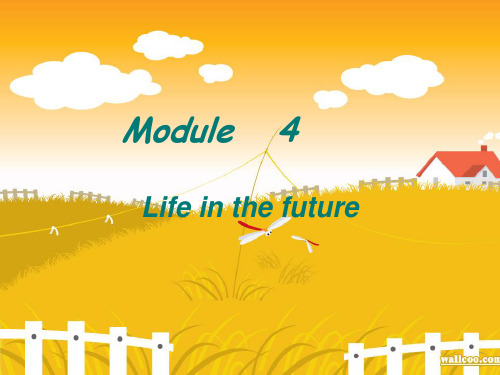
1.Will they study at home?
Yes, they will./ No, they won’t.
2.Will everyone send their homework by email? Yes, they will./ No, they won’t.
3.Will there be teachers? Yes, there will./ No, there won’t.
学生在前一模块中已学习了一般将来时的肯定、 否定与一般疑问的表达方式,也掌握了如何表 达自己将要做什么,没做什么,也学会了如何 问别人将来是否要做某事。本单元则是在前 面的基础上引入到谈论将来生活这个话题上, 这是学生很熟悉也是较感兴趣的话题。在教 师预设的任务中,引导学生在交际中动态生 成,学生有话可说,乐于合作分享。这样就 有利于他们更好的运用课本知识,达到提高 综合运用语言能力的目的.
cell phone
Cell phones will be cheap in the future.
New words
blackboard 黑板 dictionary 字典
cable TV 有线电视 email 邮件
calculator 计算机 Internet 互联网
cell phone 手机 paper 纸
Example
No one uses________ to learn Chinese.
Listen and check( √ ) the true sentences for Daming and Betty.
Betty
1.Everyone will study at home in the future.
blackboard cable TV calculator cell phone chalk computer dictionary email Internet paper pen pencil radio ruler satellite TV
七年级英语下册Module4LifeinthefutureUnit1Everyonewillstud
Module 4 Life in the future Unit 1 Everyone will study at home教学目标1.Knowledge and Ability Objects1) Key vocabulary:chalk; ruler;carry; change; future; need; will; level; be able to ;not...any more; free 2) Key structures:Will you use books in the future?Yes, we will.No, we won’t. ( will not= won’t)Teachers will write on the blackboard with chalk in the future.Teachers will not write on the blackboard with chalk in the future..3)To train students’listen ing skill and commu nicative competence.2.Method Objects in Teaching1)Listening,speaking , reading and writing methods.2)Discussion method.3)Pairwork.3.Sensibility and ValueTo be interested in learning English and to insert imagination by predicting the future.教学重点1.Key vocabulary in this unit2.Key structures:Will you use books in the future?Yes, we will./No,we won’t.1word格式支持编辑,如有帮助欢迎下载支持。
